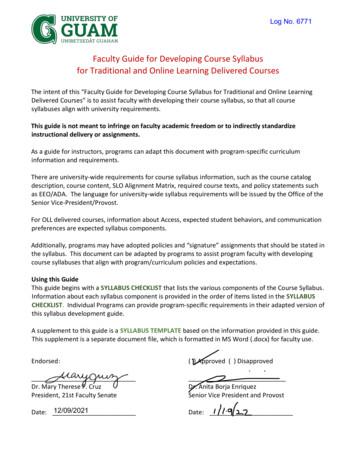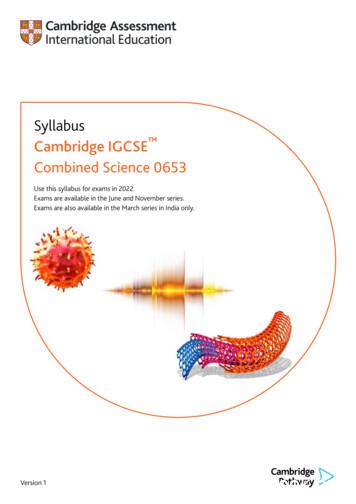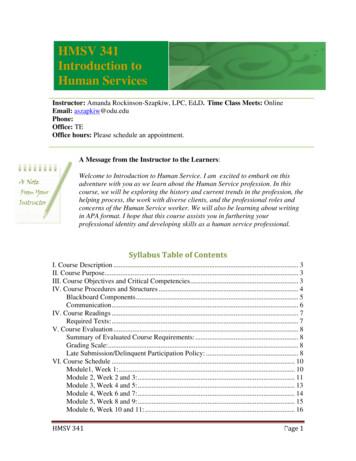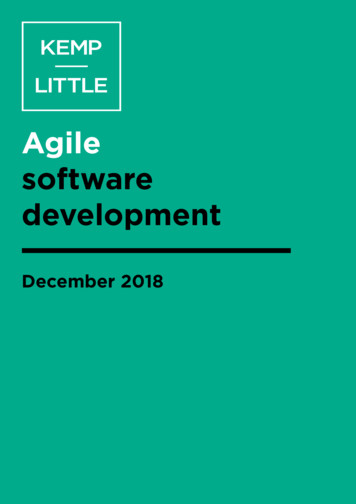Course Syllabus Offered By Department Of Chemistry With Effect From .
SYL Course Syllabus offered by Department of Chemistry with effect from Semester A 2020/21 This form is for the completion by the Course Leader. The information provided on this form is the official record of the course. It will be used for the City University’s database, various City University publications (including websites) and documentation for students and others as required. Please refer to the Explanatory Notes on the various items of information required. Prepared / Last Updated by: Name: Prof. István T Horváth Academic Unit: Department of Chemistry Phone/email: 3442 7878 / istvan.t.horvath@cityu.edu.hk Date: 18 November 2019 Course Syllabus Jun 2017 1
City University of Hong Kong Course Syllabus offered by Department of Chemistry with effect from Semester A 2020/21 Part I Course Overview Industrial Chemistry Course Title: CHEM4033 Course Code: 1 semester Course Duration: 4 credits Credit Units: B4 Level: 1Arts and Humanities 1 Proposed Area: (for GE courses only) Study of Societies, Social and Business Organisations Science and Technology Medium of Instruction: English Medium of Assessment: English (Course Code and Title) CHEM2006/BCH2006 Principles of Inorganic Chemistry CHEM2007/BCH2007 Principles of Organic Chemistry CHEM2008/BCH2008 Principles of Physical Chemistry Precursors: Nil Prerequisites: (Course Code and Title) Equivalent Courses: BCH4033 Industrial Chemistry (Course Code and Title) Exclusive Courses: Nil (Course Code and Title) Course Syllabus Jun 2017 2
Part II 1. Course Details Abstract (A 150-word description about the course) In this course, students will be introduced to the fundamentals of industrial chemistry and its role in current technologies in the chemical, petrochemical, and pharmaceutical industries. Following completion of the course students will be able to describe the role of chemical, petrochemical, and pharmaceutical industries in the world; identify the key concepts and laws of physical chemistry used in technology; comprehend the fundamentals of chemical engineering; review the production of energy and raw materials. Describe the chemical processes related to water; identify the most important inorganic and organic products and the technologies for their production; and discuss the most important challenges for sustainable development. 2. Course Intended Learning Outcomes (CILOs) (CILOs state what the student is expected to be able to do at the end of the course according to a given standard of performance.) No. CILOs# Weighting* (if applicable) 1. Explain the role of chemical, petrochemical, and pharmaceutical industries in the world. Describe the use of the key concepts and laws of physical chemistry and chemical engineering in technology. Analyse the role and the production of energy and raw materials including drinking water and waste water. Describe a technology using processes at the molecular level for the production of key inorganic and organic products. Design a list of criteria to evaluate the feasibility of a project / plan related to sustainable developments. 5% Discovery-enriched curriculum related learning outcomes (please tick where appropriate) A1 A2 A3 15% 30% 2. 3. 4. 5. 40% 10% * If weighting is assigned to CILOs, they should add up to 100%. 100% # Please specify the alignment of CILOs to the Gateway Education Programme Intended Learning outcomes (PILOs) in Section A of Annex. A1: A2: A3: Attitude Develop an attitude of discovery/innovation/creativity, as demonstrated by students possessing a strong sense of curiosity, asking questions actively, challenging assumptions or engaging in inquiry together with teachers. Ability Develop the ability/skill needed to discover/innovate/create, as demonstrated by students possessing critical thinking skills to assess ideas, acquiring research skills, synthesizing knowledge across disciplines or applying academic knowledge to self-life problems. Accomplishments Demonstrate accomplishment of discovery/innovation/creativity through producing /constructing creative works/new artefacts, effective solutions to real-life problems or new processes. Course Syllabus Jun 2017 3
3. Teaching and Learning Activities (TLAs) (TLAs designed to facilitate students’ achievement of the CILOs.) TLA Lectures and tutorials Lectures and tutorials Videos Animations Group discussion 4. Brief Description CILO No. 1 The contribution of the chemical, petrochemical, and pharmaceutical industries to the economy will be demonstrated by using global data. The key concepts industrial chemistry and the fundamentals of chemical engineering will be described. Use of process schemes and videos to review and demonstrate the production of energy and raw materials, including the treatment waste water and the production of drinking water. Use of animations to illustrate key inorganic and organic products and some of the production process. Group work to compose a list of criteria to be assessed by peers through online discussion. 2 Hours/week (if applicable) 3 4 5 Assessment Tasks/Activities (ATs) (ATs are designed to assess how well the students achieve the CILOs.) Assessment Tasks/Activities Continuous Assessment: 40% Recollection Tests & Tutorial Assignments Group Presentations Reports & Debates Examination: 60% (duration: 2 hours) 1 CILO No. 2 3 4 5 Weighting* * The weightings should add up to 100%. Remarks 20% 15% 5% 100% Starting from Semester A, 2015-16, students must satisfy the following minimum passing requirement for courses offered by CHEM: “A minimum of 40% in both coursework and examination components.” 5. Assessment Rubrics (Grading of student achievements is based on student performance in assessment tasks/activities with the following rubrics.) Assessment Task 1. Recollection Tests & Tutorial Assignments 2. Group Presentations Course Syllabus Jun 2017 Criterion Ability to explain the concepts of industrial chemistry and their use in chemical processes and technologies Ability to explain an industrial chemical processes and the role of their products in society. Excellent Good Fair Marginal Failure (A , A, A-) (B , B, B-) (C , C, C-) (D) (F) High Significant Moderate Basic Not even reaching marginal levels High Significant Moderate Basic Not even reaching marginal levels 4
3. Reports 4. Examination 3.1 Capacity for self-directed learning to understand the basics of industrial chemistry 3.2 Ability to explain industrial processes Ability to answer questions in details concerning the role of physical chemistry in industrial processes, the basics of chemical engineering, the production of energy, raw materials, inorganic and organic products and some of their production process, and discuss sustainable development. High Significant Moderate Basic Not even reaching marginal levels High Significant Moderate Basic Not even reaching marginal levels Part III Other Information (more details can be provided separately in the teaching plan) 1. Keyword Syllabus (An indication of the key topics of the course.) The role of chemical technology in the world. The role of physical chemistry in chemical technology. The fundamentals of chemical engineering. Energy production. The raw materials of the chemical and petrochemical industry. Chemical processes related to water. The products and processes of the inorganic chemical industry. Synthetic fuels. C1 chemical processes. The products and processes of the organic chemical industry. Polymers Agricultural chemicals. The fundamentals and products of biotechnology. Challenges for sustainable developments. 2. Reading List 2.1 Compulsory Readings (Compulsory readings can include books, book chapters, or journal/magazine articles. There are also collections of e-books, e-journals available from the CityU Library.) 1. Slides of the lectures 2.2 Additional Readings (Additional references for students to learn to expand their knowledge about the subject.) 1. Benvenuto, M. A. Industrial Chemistry, Walter de Gruyter; Berlin/Boston, 2014. Course Syllabus Jun 2017 5
Annex (for GE courses only) A. Please specify the Gateway Education Programme Intended Learning Outcomes (PILOs) that the course is aligned to and relate them to the CILOs stated in Part II, Section 2 of this form: GE PILO Please indicate which CILO(s) is/are related to this PILO, if any (can be more than one CILOs in each PILO) PILO 1: Demonstrate the capacity for self-directed learning PILO 2: Explain the basic methodologies and techniques of inquiry of the arts and humanities, social sciences, business, and science and technology PILO 3: Demonstrate critical thinking skills PILO 4: Interpret information and numerical data PILO 5: Produce structured, well-organised and fluent text PILO 6: Demonstrate effective oral communication skills PILO 7: Demonstrate an ability to work effectively in a team PILO 8: Recognise important characteristics of their own culture(s) and at least one other culture, and their impact on global issues PILO 9: Value ethical and socially responsible actions PILO 10: Demonstrate the attitude and/or ability to accomplish discovery and/or innovation GE course leaders should cover the mandatory PILOs for the GE area (Area 1: Arts and Humanities; Area 2: Study of Societies, Social and Business Organisations; Area 3: Science and Technology) for which they have classified their course; for quality assurance purposes, they are advised to carefully consider if it is beneficial to claim any coverage of additional PILOs. General advice would be to restrict PILOs to only the essential ones. (Please refer to the curricular mapping of GE programme: http://www.cityu.edu.hk/edge/ge/faculty/curricular mapping.htm.) B. Please select an assessment task for collecting evidence of student achievement for quality assurance purposes. Please retain at least one sample of student achievement across a period of three years. Selected Assessment Task Course Syllabus Jun 2017 6
3442 7878 / istvan.t.horvath@cityu.edu.hk Date: 18 November 2019 SYL . 2 Course Syllabus Jun 2017 City University of Hong Kong Course Syllabus offered by Department of Chemistry with effect from Semester A 2020/21 Part I Course Overview Course Title: Industrial Chemistry Course Code: CHEM4033 Course Duration:
Faculty Guide for Developing Course Syllabus 2 SYLLABUS CHECKLIST NOTE: THE ORDER OF SYLLABUS COMPONENTS PRESENTED BELOW IS NOT A REQUIRED ORDER TO FOLLOW. THIS CHECKLIST REFLECTS COMPONENTS THAT SHOULD BE INCLUDED IN THE COURSE SYLLABUS. FACULTY WILL DETERMINE THE ORDER OF THE SYLLABUS COMPONENTS. Course ID and Instructor Information _ 1.
posts by the due date. There is no make-up for quizzes (instead, I will drop two lowest grades). For exams, make-ups will be considered only for legitimate reasons with proper documentation. THIS IS A SAMPLE SYLLABUS - Current course syllabus is available within Canvas SAMPLE Syllabus SAMPLE Syllabus SAMPLE Syllabus Syllabus
Computer Science ATAR Year 11 syllabus . Organisation . This course is organised into a Year 11 syllabus and a Year 12 syllabus. The cognitive complexity of the syllabus content increases from Year 11 to Year 12. Structure of the syllabus . The Year 11 syllabus is divided into two unit
Version 1.13 P l e a s e r e a d : Creating a syllabus or overview will not affect the Canvas Syllabus or Syllabus Creator tool. However, If a syllabus is published within CreatorPro LTI, the Canvas Syllabus or Syllabus Creator tool is replaced with CreatorPro’s Syllabus and to revert the changes a SSD Support Case will need to be
Syllabus of Sixth Semester B. Pharm. 069 11. Syllabus of Seventh Semester B. Pharm. 081 12. Syllabus of Eight Semester B. Pharm. 091 B Ordianance and Rules (M. Pharm.) 101 1. Ordinance and Rules 102 2. Structure of Syllabus 107 C. Syllabus (Pharmaceutics) 115 D. Syllabus (
Changes to this syllabus for 2022 62 Changes to this syllabus For information about changes to this syllabus for 2022, go to page 62. The latest syllabus is version 1, published September 2019. Any textbooks endorsed to support the syllabus for examination from 2019 are still suitable for use with this syllabus.
Course Schedule The course schedule section contains a detailed plan of the course topics, readings, and activities. It is the same as the course schedule contained in this syllabus. Syllabus This syllabus section contains the syllabus, a detailed document about the course with topics to be covered, required reading and
Agile software development therefore has a focus on: . Scrum is one of the most popular agile development methodologies. Scrum is a lightweight framework designed to help small, close-knit teams of people to create complex software products. The key features of the scrum methodology are as follows: Scrum team: A team of people using this methodology are called a “scrum”. Scrums usually .























